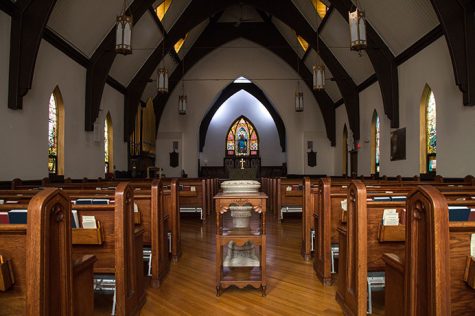Banerjee: A24, Hollywood’s newest Icarian project
Six-year-old entertainment company A24 has reached a remarkable level of success for its age, but its goals are quickly outpacing its means as the company tries to release three times the industry average.
The employees of movie company A24, pictured at their New York office on West 26th Street, have no titles and pride themselves on operating like an Internet start-up. (Carolyn Cole/Los Angeles Times/MCT)
October 8, 2018
Established in 2012, dynamic entertainment company A24 has radically changed the way independent film is received across the world. From its 2013 hit Spring Breakers to more recent releases such as Eighth Grade, the company is known for putting out stylistic, unique cinematic experiences.
In the past six years, the studio has gone from producing five movies a year to triple that, with 17 movies with a 2018 release date. In creating a brand name, the production company has expanded very rapidly and somewhat chaotically. While the system has held up fairly well so far with the influx of attention and power, its attempts to put out film after film indicate an eventual collapse.
New York-based A24 is, in many ways, responsible for the creation and increased popularity of accessible indie films, allowing unknown directors and unfamiliar stories to reach larger audiences in mainstream theaters. In recent memory, it has been able to reach an impressive level of success for such a young company, receiving 24 Academy Award nominations and six wins.
However, unlike its competitors, A24 aims at producing 18 to 20 movies a year. Other companies focus on releasing under a dozen a year at most. Despite working with a larger swath of production and distribution companies, Annapurna Pictures, a prominent and popular independent film company, has a far smaller yearly aim that falls under its purview as an independent in the world of conglomerate production. In five to eight films a year, the company focuses intensely on the specifics of film.
This production practice is leading to two distinct issues: an inability to adequately promote each film and an overall drop in the impressive individual quality on which the company is based.
Because there is such a wealth of film being produced in such a short time by a relatively small company, there is simply not enough money to advertise and promote each film to its greatest potential. Despite being a fairly devoted A24 fan, I can only identify seven of the 15 releases of 2017. Certain films, such as Lady Bird or The Disaster Artist, were well-marketed and reached high critical acclaim, but other movies such as Sean Baker’s remarkable The Florida Project and David Lowery’s A Ghost Story fell into relative obscurity.
RELATED: The art of the scream: How horror has impacted the cinema industry
Cinema can be incredibly exclusive as an art, and, already working at a disadvantage as a smaller company, A24 often seems to struggle to make sure each of its films gets its due credit. Audiences outside the more dedicated and niche-viewing groups have not been exposed to a majority of the company’s films. The ones that do make it into major theaters often seem to do fairly well, racking up nominations and praise across the board.
An important aspect to note is that A24 rarely makes bad movies. Its filmography isn’t spotless, but for the most part, it is full of some of the most visually, stylistic, and narratively interesting films of the last decade. But, because of the sheer breadth of film that it puts out now, it’s difficult to pick out stars. In the past, watching an A24 film was a fairly safe bet. You knew what you were getting into before you started, and you had some sort of guess as to its relative quality. However, now, there are so many films that the intrinsic qualities that shaped fans’ approval of A24 are fading ever so slowly. There are fewer gems — truly remarkable movies — and a lot more generally good movies. Nothing wrong with them, for the most part; they just lack what made films such as Ex Machina and The Witch so remarkable and game-changing.
Again, this isn’t to say that A24 has lost its mojo. This year’s releases, films such as Hereditary and First Reformed, are fantastic genre pieces and interesting examples of what the company can produce. But as its goals become loftier and its expectations larger, A24 must adapt to handle mixing consumer appeal with dedicated art.
RELATED: Horror Classics: Rosemary’s Baby relevant horror after 50 years




















